DVR_(-)-FR182877_Evans
advertisement
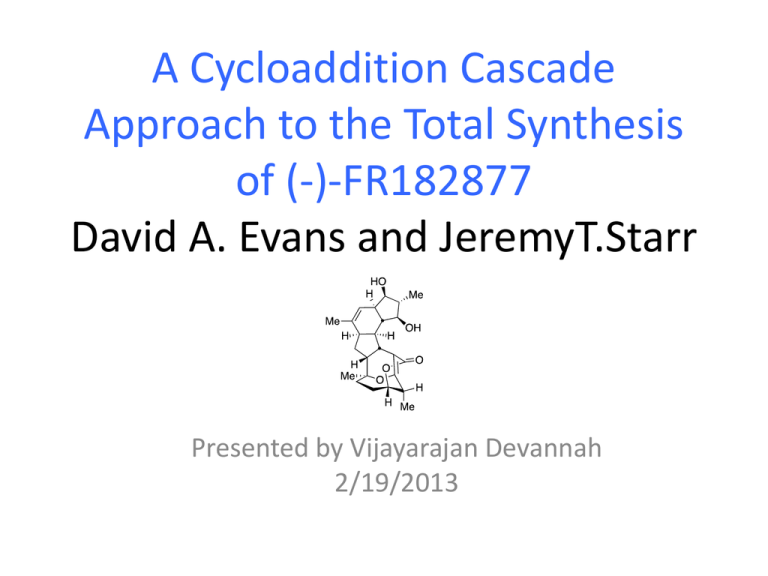
A Cycloaddition Cascade Approach to the Total Synthesis of (-)-FR182877 David A. Evans and JeremyT.Starr Presented by Vijayarajan Devannah 2/19/2013 About Prof. David A.Evans Education and Professional: • 1941- Born in Washington D.C • 1963- A.B degree, Oberlin College • 1967- Ph.D at Cal.Tech under Robert E. Ireland • 1973-1983 Professor at Caltech. • 1983-present- Professor at Harvard University Notable Awards: • 1999 - The prelog medal, ETH, Zurich switzerland • 2000- Arthur C.Cope Award, ACS • 2007- Herbert C. Brown Award for creative research in synthetic methods, ACS • 2008-Elected to fellow of Royal Society of Chemistry,UK • 2010-ACS Award for creativity in Molecular Design and synthesis • 2013-ACS Roger Adams Award • >330 publications Research Focus: Target Oriented Synthesis and New reaction development 2 About (-)FR182877 • In 1998, Sato and co-workers reported cytotoxic natural product (WS9885B), isolated from Streptomyces. • WS9885B renamed as FR182877 • It is a potent microtubule-stabilizing agent and it exhibits potent antitumor activity • Its performance is similar to TAXOL in the untreated Baby Hamster Kidney (BHK) cells, and it holds forth promise as a new lead structure for the development of antitumor therapeutics. 3 Challenges posed by FR182877 • Hexacyclic architecture containing 12 stereogenic centers. • It contains strained anti-Bredt bridgehead olefin • Vinylogous carbonate embedded in a fused 6-6-7 ring system • The epoxide did not inhibit tumor cell growth and thus the strained C2-C20 double bond may be necessary for the observed antitumor activity. 4 Retrosynthesis C11-C20 5 Aldol B 5 Forward Synthesis Scheme 2: Scheme 3: 6 Scheme 4: 7 Scheme 5: Highly optimized suzuki coupling condition The coupling was sensitive to the choice of base • Strong bases (hydroxides or oxides) or less halophilic cations resulted in slower reaction rate and competitive decomposition of SM via protodeborylation, Oxidation, elimination etc. • Silver bases completely decomposes products • Carbonates had the good selectivity and Tl2CO3 gives good reaction at rt. 8 Scheme 6: 9 NMR analysis shows 2H pyran equilibirium Studying the inherent stereoselectivity of the TADA cascade Scheme 7: 60oC, CDCl3 3hr Model IMDA study shows good endo selectivity and poor diastereoselectivity 10 Scheme 8: 11 Conclusion • 1H • 13C NMR and Mass spectral characteristics were identical to those published for the natural product 1. NMR spectral data agreed within 2% margin of error. • Synthetic 1 exhibited an optical rotation of [αD23]= -5o as compared to [αD23]= -3.5o reported for the natural sample, and it lead to conclude that synthetic 1 was of the same absolute stereochemistry as natural (-)-FR182877. • Semiempirical calculations of the transannular Diels-Alder cycloaddition cascade were carried out to determine the origins of asymmetric induction. 12 Thank You 13


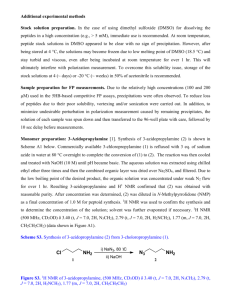
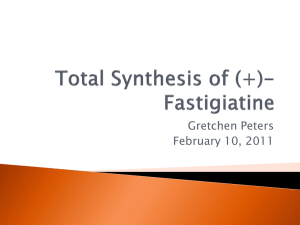
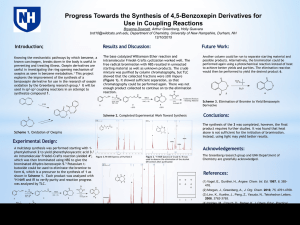
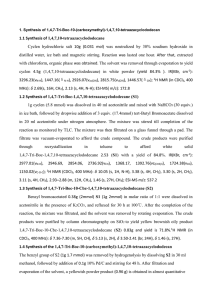
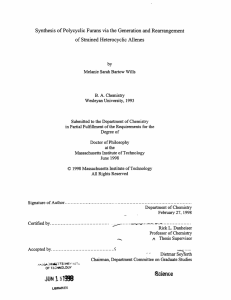
![I. INTRAMOLECULAR [4+2] CYCLOADDITIONS OF CONJUGATED YNONES AND RELATED SPECIES.](http://s2.studylib.net/store/data/011175397_1-cd5ff9fc45f9ba0b99707809d7dd65f0-300x300.png)